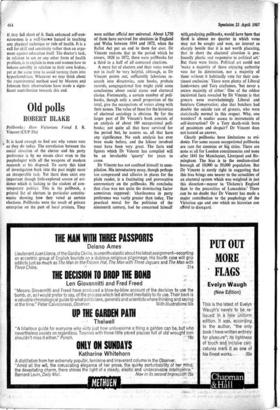Old polls
ROBERT BLAKE
Pollbooks: How Victorians Voted J. R. Vincent (CUP 55s)
It is hard enough to find out why voters vote as they do today. The correlation between the social situation of the elector and his party preference is by no means clear even to the psephologist with all the weapons of modern research at his disposal. To carry this kind of investigation back into the past might seem an insuperable task. Yet there does exist one important though little-explored source of evi- dence which is lacking to the student of con- temporary politics. This is the pollbook, a printed list of electors in particular constitu- encies showing how they voted at certain elections. Pollbooks were the result of private enterprise on the part of local printers. They were neither official nor universal. About 1,750 of them have survived for elections in England and Wales between 1694 and 1872, when the Ballot Act put an end to them for ever. Dr Vincent reckons that in the period which he covers, 1826 to 1872, there were pollbooks for a third to a half of all contested elections.
A mere list of electors and their votes would not in itself be very helpful, although, as Dr Vincent points out, sufficiently laborious re- search into directories, rate books, probate records, congregational lists might yield some conclusions about social status and electoral choice. Fortunately, a certain number of poll- books, though only a small proportion of the total, give the occupations of voters along with their names. The value of these for the historian of electoral sociology is obvious. By far the larger part of Dr Vincent's book consists of an analysis of about 180 occupational poll- books; not quite all that have survived for the period but, he assures us, all that have any significance. No such analysis has ever been made before, and the labour involved must have been very great. The facts and figures which Dr Vincent has compiled will be an invaluable 'quarry' for years to come.
Dr Vincent has not confined himself to com- pilation. His introductory essay, though perhaps too compressed and allusive in places for the plain reader, is a fascinating and provocative commentary on the pollbooks. He concludes that class was not quite the dominating factor sometimes supposed: 'classlessness in party preference was vastly greater than today. The practical moral for the politician of the nineteenth century, had he concerned himself
with analysing pollbooks, would have been that ther6 is almost no quarter in which votes may not be sought and won, no interest so sharply hostile that it is not worth placating, that in short the electoral situation is pro- foundly plastic and responsive to political art.' But there were limits. Political art could not `make a majority of those enjoying authority vote for its diminution, nor a majority of those without it habitually vote for their con- tinued exclusion.' There were plenty of Liberal landowners and Tory craftsmen, 'but never a secure majority of either.' One of the oddest incidental facts revealed by Dr Vincent is that grocers were overwhelmingly Liberal and butchers Conservative; also that butchers had double the suicide rate of grocers, who were statistically normal in this respect. Why, one wonders? A readier access to instruments of self-destruction? Or a Tory death-wish born of pessimism and despair? Dr Vincent does not hazard an answer.
Clearly pollbooks have limitations as evi- dence. For some reason occupational pollbooks are rare for counties or big cities. There are none at all for London constituencies and none after 1841 for Manchester, Liverpool and Bir- mingham. The bias is to the medium-sized borough of 10,000 to 50,000 population. But Dr Vincent is surely right in suggesting that this bias brings one nearer to the actualities of an electoral system which was weighted in just this direction—nearer to 'Dickens's England than to the precocities of Lancashire.' There can be no doubt that Dr Vincent has made a major contribution to the psephology of the Victorian age and one which no historian can afford to disregard.






































 Previous page
Previous page